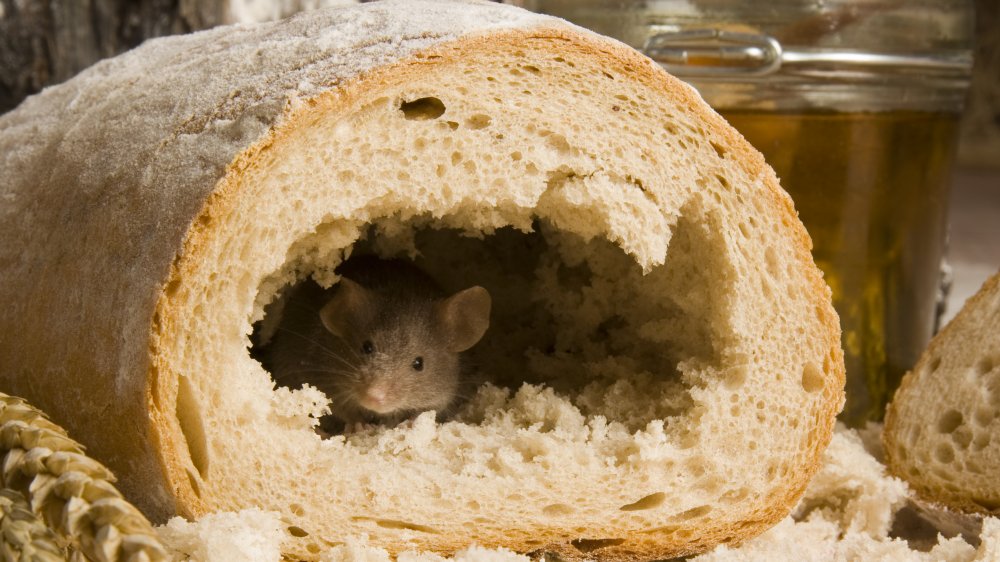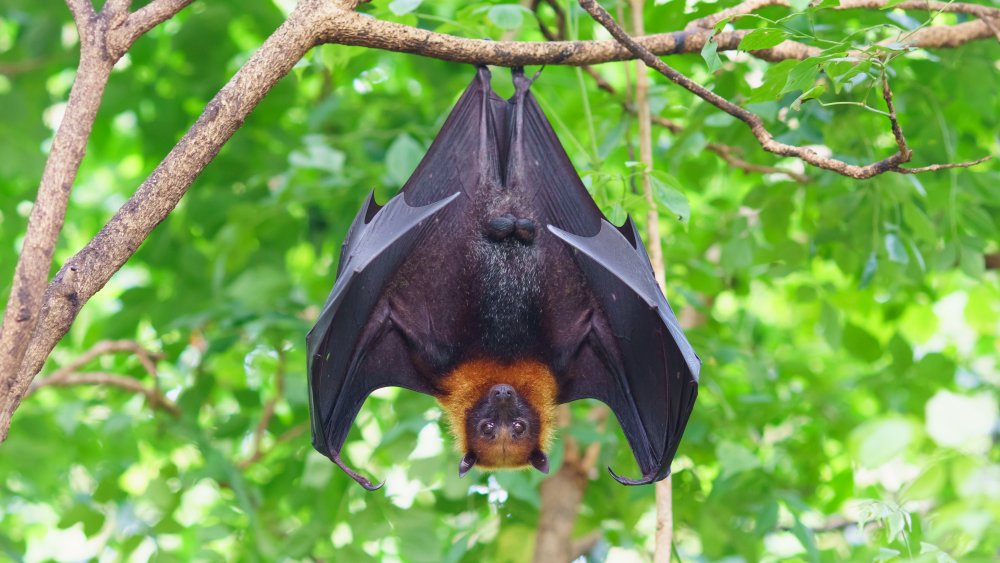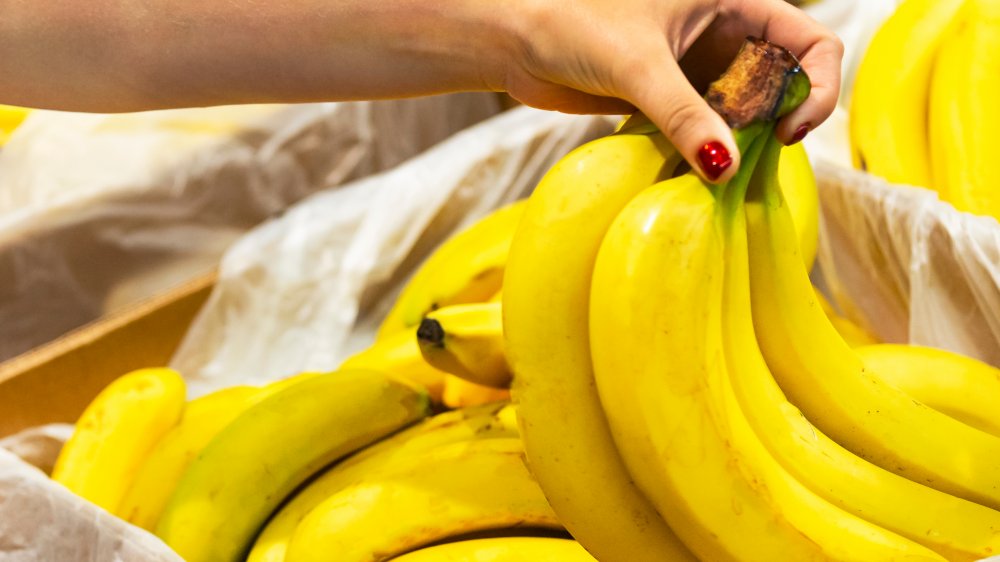Grossest Things People Have Found In Store-Bought Food
You probably know from experience that fast food can be risky, especially if you're the unlucky soul who found a needle in her burger at Burger King or the human skin in his chicken sandwich at Arby's. But supermarkets? They're supposed to be trauma-free spaces, filled with carefully packaged and meticulously labeled food products. In the United States, that's what the FDA is for, after all.
The FDA is happy to help state and local regulatory agencies with a model food code, training, scientifically-based guidance, and technical assistance. And if you, the consumer, are unlucky enough to find anything out-of-the-ordinary in your food, you can report it directly via phone, email, or online formula. The FDA will come to your aid. Right? Only on paper. As the Institute of Medicine observes, the government's role in regulating food safety is "complex, fragmented, and in many ways uncoordinated." Yikes.
What's the worst that can happen in this "fragmented" system? You may remember when, in 2009, the FDA confirmed that they'd found frog or toad residue in a Pepsi can (via CNN). The animal, strangely enough, lacked internal organs. But while the regulatory agency conducted an investigation, it failed to find abnormalities at the Pepsi plant in Atlanta, where the soda was bottled. It took no further action, Needless to say, neither did Pepsi. And if you think that's bad, just wait until you read the rest of this article.
Grapes with a side of spider?
In June 2010, Jorge and Jorge Miguel Fuertes bought a bag of Anthony's red seedless grapes from Whole Foods Market. Upon opening it on their lunch break, they found that the bag had become the home of two black, shiny spiders with a red hourglass on their underbellies (via UPI). The Fuertes identified the spiders as Black Widows, an insect whose venom is 15 times more toxic than a rattlesnake's (via Live Science). How did Whole Foods Market compensate the men for their brush with death? A full refund. As the supermarket's spokesman nonchalantly explained, "Unfortunately these things happen from time to time with fresh produce. Spiders are part of the natural environment where grapes are grown."
It's worth noting that Whole Foods Market may be right. The 2010 incident is not the only one in which venomous spiders have been found hanging out in bags of fresh grapes. In 2012 ABC reported that a woman in Gloucester, Massachusetts was rinsing grapes in her sink when she found a Black Widow spider, too. Then, in 2016 the Reyden family in Freemont, New Hampshire reported opening a bag of organic grapes, only to find and kill a Black Widow of her own. Like the Fuertes, the Reydens were offered a full refund (via Boston 25 News). Given the fact that eating too many grapes can cause nausea, vomiting, and diarrhea, we have to ask, are they really worth it?
Remember #TunaGate?
In 2015 28-year-old Nottingham, England resident, Zoe Butler, bought a can of Princes Tuna to prepare her child's dinner. When she opened it, she found herself staring at a pair of beady, black eyes (via the New Zealand Herald). For a couple of months afterward, experts debated whether the "mysterious slime blob" was a tongue-eating parasite or a very small crab (via HuffPost). The internet screamed #TunaGate. Eventually, the creature was identified as a Megalopa. For all of you who didn't major in marine biology, that's a crustacean in its final, larval stage. There are a lot of things that you can add to your tuna to upgrade your tuna salad. Crab larvae aren't among them.
What happened next? Princes Tuna hurried to tell Bulter that the crab, in fact, posed "no food safety risks." It's unclear whether they took any further action. Lucky for them, Butler told newspapers that she didn't "want a lifetime's supply of tuna," anyways (Via HuffPost).
That time when a candy bar bit back
If you were following the news around New Year's 2010, maybe you read about Texan, Sue Calhoun, who drove from Brownsboro to Dallas with her husband to buy a new tractor. When she bit into a Milky Way candy bar that she'd bought for the trip, the Milky Way bit her back. She found a tooth with a silver filling (Via UPI). Mars Candy, the company which makes Milky Way, promised that they "take issues such as these very seriously," and Calhoun claimed they offered free candy bar coupons and an apology letter (via KLTV).
Calhoun also said the company asked for the tooth so that they could run their own investigation. We haven't found any follow-up articles on the incident, but Calhoun didn't seem keen on doing so at the time. According to UPI, she wanted her own dentist to examine the tooth, fearing that Mars Candy might "keep the evidence" and that she would never "see it again."
Have you lost your appetite for Milky Ways like Calhoun did? Maybe next time, opt for a Snickers. As far as we know, no teeth have been found in those bars.
Have some bread, baking equipment included
Imagine waking up during your Christmas holidays, toasting a slice of bread, biting into it, and ... instead of nutty, springy, and slightly crunchy ... tasting an oven mitt. That's approximately what happened to a woman in Omagh, Ireland in December 2008 (via BBC News). Premier Foods, the brand behind the bread, accepted responsibility for the incident, apologized for breaking environmental and health laws, and paid a £750 fine (roughly $930 US dollars).
Omagh's local council chairman, Paddy Magowan, assured newspapers that the so-called "substantial" fine would "send out a warning to all other companies." The sum may seem insubstantial to you, but it may actually have hit Premier hard. In 2018, The Guardian reported that the company was facing a debt of over £496 million pounds, or nearly $613 million dollars. As for the poor woman who ate an oven mitt for breakfast? We hope she's not permanently traumatized.
That time when a loaf came with a little extra protein
But if you think that a loaf baked with synthetic fibers is bad, you haven't heard anything yet. Not two years after the oven-mitt incident, Stephen Forse, a resident of Oxfordshire, England, cut into a slice of Premier Food bread that he had ordered online from Tesco (via The Guardian). After eating more than a slice, he found a "dark-colored" furry object (via BBC). When Environmental Health Officers visited his house, they identified the object as a mouse with its tail cut off. Not the most welcome of discoveries, especially when you consider that mice can be carriers of Hemorrhagic Fever, Lymphocytic Chorio-meningitis, and Salmonellosis (via the Center For Disease Control and Prevention). To this day, Forse does not know if he or his kids accidentally ate the tail.
What was Premier Foods fined this time? BBC reports that they paid a total of £16,600 or roughly $20,500 in fines. In the aftermath, the company apologized again and assured the public that it "took its obligations for health and hygiene seriously." You'll forgive us, nevertheless, if we choose not to eat their baked goods any time soon.
The packaged salad that grew wings
Next time you're itching for a packaged salad, make sure you inspect the bag before buying. In 2017, Walmart was forced to recall Organic Marketside Spring Mix salads with the production code G089B19 after two customers in Florida found a decomposing bat in theirs (via the New York Times and BBC). The Centers for Disease Control and Prevention stepped in, tested the bat for rabies, and issued a warning that anyone who had eaten a salad with the same production code should contact their health department. Neither of the customers in question showed any sign of rabies. Because the bat was too "deteriorated" to produce any definitive results, the CDC recommended that they be treated, anyhow (via The Guardian).
After the incident, the company ensured the public that it "rigorously complies with all food safety regulations." We were, however, unable to find any information as to how they compensated their unsuspecting customers. Given the number of diseases that bats can carry, we hope they got more than a few free salads.
Baby food that drew blood
Nothing should be safer than baby food. At least, that's what Brooklyn mother Minerva Figueroa thought when she bought her year-old son a jar of Gerber in 1986. She was, unfortunately, proved wrong when her baby started spitting out the strained bananas with tapioca. Noticing blood on his tongue, Figueroa took him to be treated at Kings County Hospital for a lacerated throat (via The New York Times). What did she find in the food? Pieces of glass.
Figueroa's experience was just one of many that year. According to the Washington Post, in 1986 consumers found glass in Gerber baby food in at least 10 states, and in at least 10 varieties of baby foods including strained bananas, strained peaches, junior bananas with pineapple and tapioca, and strained carrots. While the FDA attributed the incidents to breakages during manufacturing, shipping, or to unproperly unscrewing lids, they did not rule out "the possibility that someone did willfully tamper with the product."
The 1986 scare was not the first time Gerber had come under fire. In 1984, the company recalled 550,000 jars of apple-plum and apple-cherry juices after a customer found glass in them (via AP).
But Gerber's response to the 1986 incident was vastly different. After the state of Maryland banned the sale of Gerber Strained Peaches, the company sued the state for "creating a climate of fear and confusion" (via The New York Times).
Bananas with stingers
In 2017, Nathan Coleman's young daughter lost her appetite when she opened a bag of bananas that her family had bought from a Costco in Halifax, Canada. Inside the bag, still alive and "squirming," was a scorpion (via CBC). Experts identified the scorpion as a Guatemalan Buthhids. In an interview with the news, Coleman described the experience as "scary" and "shocking" (via Global News). We can only imagine.
Costco offered the Coleman family a full refund, which they turned down. What was, perhaps, the only upside to the incident? According to Andrew Hebda, a zoologist at the Nova Scotia Museum of Natural History, the presence of the scorpion indicated that fewer pesticides were used to grow the fruit. Otherwise, the scorpion would have been killed off during the bananas' cultivation.
Still curious? According to the CBC, if you want to see the scorpion, you can find it on display at the Nova Scotia Museum of Natural History.








